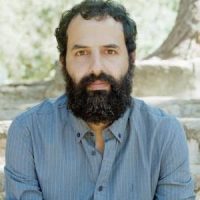May 6, 2017
Edited by David Sanders
Specimen Days
1606—Lorenzo Lippi, [Perlone Zipoli], poet/painter, is born.
1830—Guido Gezelle, Flemish priest/poet, is born.
1859—Willem J T Kloos, Dutch poet (Act of Simple Justice)
1861—Rabindranath Tagore, Indian philosopher/poet/writer (Nobel 1913), born in Calcutta (d. 1941).
1904—Harry Martinson, Sweden, novelist/poet (Trade Wind-Nobel 1974), is born.
1940—Henry Habibe, Arubian poet (Kerensentenchi), is born.
1924—Carel S Adama van Scheltema, poet/writer (socialism), dies at 47.
1961—Lucian Blaga, philosopher/poet (Transcendental censor), dies at 65.

"Have you seen a tramp collier“
Have you seen a tramp collier come out of a hurricane—
with broken booms, gunwales shot to pieces,
crumpled, gasping, come to grief—
and her captain gone all hoarse?
Snorting, she puts in at the sunlit wharf,
exhausted, licking her wounds
while the steam thins in her boilers.
—Harry Martinson
[Translated by Stephen Klass]
“Have you seen a tramp collier come out of a hurricane?” – Harry Martinson
World Poetry
Another Nigerian Wins Brunel International African Poetry Prize

Nigerian poet, Romeo Oriogun, has won the 2017 Brunel International African Poetry Prize. Among the shortlist of ten poets selected from nearly 1,200 entries, Oriogun earned the unanimous decision of the judges. His entry was about “masculinity and desire in the face of LGBT criminalisation and persecution”.
Nigerian poet Romeo Oriogun has won the 2017 Brunel International African Poetry Prize.
Recent Reviews
Float by Anne Carson
by Alexa Winik
Fractured, prismatic, and amorphous, Float (Alfred A. Knopf, 2016) embodies the best of what any reader can expect when picking up Anne Carson’s poetry – that is, of course, the unexpected. With the acclaim Carson has earned for her genre-bending collections, such as the lyrical essay The Beauty of the Husband and the novel-length prose poem The Autobiography of Red, the Canadian classicist has already established herself as a looming figure in the arena of postmodern poetry for her playful unconventionality and inventive hybrid constructions of poetry and prose.
Rime without Reason
by Kelly Grovier
Malcolm Guite has made an intriguing literary discovery, one that has eluded critics for over 200 years: the inspiration for Samuel Taylor Coleridge’s epoch-defining poem “The Rime of the Ancient Mariner”. But this is no ordinary scholarly find. To be accepted, Guite’s revelation requires a particular frame of mind, or what the Romantic poet himself called a “willing suspension of disbelief”. Guite contends that the true source for the Mariner’s arduous odyssey – from degradation to redemption after committing the cosmic crime of killing the albatross that had guided his imperilled ship through the Antarctic mist and ice – was, in fact, the physical, spiritual and psychological torments that Coleridge himself would suffer in the years and decades after he wrote the poem when he was just twenty-five years old.
Fractured, prismatic, and amorphous, Float embodies what any reader can expect when picking up Anne Carson’s poetry – the unexpected.
Broadsides
The Chinese Factory Workers Who Write Poems on their Phones
by Megan Walsh
It’s hard to think of anywhere in the world where becoming a poet is a canny career move, but this is especially true for the poorest and most disadvantaged trying to get a foothold in China’s frenzied special economic zones. In recent years there have been a flurry of documentaries highlighting the hardships of China’s migrant workers, but the 2015 film Iron Moon drew attention to a very specific figure: the migrant worker poet. It follows several young writers battling economic and cultural prejudice in their attempts to sublimate 14-hour shifts on assembly lines into lines of poetry. We watch the young, tender-minded Wu Niaoniao (whose name means Blackbird) wandering from stand to stand in Guangzhou’s vast strip-lit Southern China Job Market, enquiring about editorial positions on internal factory newspapers. With a knowing mix of fatalism and hope that permeates the poetry of China’s migrant workers, he reads a poem and awaits their responses with a sheepish smile.
There Is Nothing Quite Like Ezra Pound’s Opera
by Russell Platt
From the evidence of recordings, the poet Ezra Pound’s 1924 opera, “Le Testament de Villon,” sounds at once extremely old and oddly new.
In the annals of sheer strangeness, few musical works inhabit as rare a zone as does “Le Testament de Villon,” an opera—sic—by Ezra Pound, who is far better known as one of the most iconoclastic poets of the twentieth century. It has never been performed in New York before, but it will be part of a trio of “offbeat operas” presented on Monday by the Cutting Edge Concerts series at Symphony Space.
In the annals of sheer strangeness, few musical works inhabit as rare a zone as does “Le Testament de Villon,” an opera—sic—by Ezra Pound.
Drafts & Fragments
Donald Trump Reads Sinister Poem about Snake Biting its Host – and Dedicates it to Anti-immigration Police
by Samuel Osborne
Donald Trump compared immigrants to a treacherous snake that bites its host as he commemorated his 100th day as President. Mr Trump read the lyrics of Al Wilson's 1968 song "The Snake," in which a woman takes an ill snake into her home only for it to bite her once it has recovered. He also paused to point out to his audience it was a metaphor for "the border."
Donald Trump used a poem to compare immigrants to a treacherous snake that bites its host as he commemorated his 100th day as President.
Poetry In the News
Politics and Poetry? St. Louis’ Next Poet Laureate Waits in the Wings while Process is Delayed
Some in the St. Louis poetry community are upset about a delay in announcing a new poet laureate. In December 2014, Michael Castro was ushered in with great fanfare as St. Louis’ first official poet. It was a two-year term. This past December, the head of the task force charged with naming Castro’s successor told poet Jane Ellen Ibur that she’d been selected. But she still doesn't have the job.
Maine Poet Wins International Prize for Poem about Husband’s Dementia
Maine poet Lee Sharkey won the Ballymaloe International Poetry Prize on Thursday at an award ceremony in Dublin, Ireland, for a poem about her husband’s dementia that the judge described as “something true and hot of life.”
This Compton Native Is L.A.'s New Poet Laureate

On Thursday, Mayor Eric Garcetti announced that Robin Coste Lewis has been named as the city's newest poet laureate. Lewis, who was born and raised in Compton, studied Sanskrit at Harvard Divinity School, and serves as a writer-in-residence at USC. She published her wildly acclaimed debut poetry collection Voyage of the Sable Venus at age 51. The book, a meditation on the black female figure through time, was later awarded the 2015 National Book Award for poetry—the first time the award had gone to a debut collection in more than four
New Books
Fast: Poems by Jorie Graham
[Hardcover] Ecco, 96 pp., $25.99

In her first new collection in five years—her most exhilarating, personal, and formally inventive to date—Graham explores the limits of the human and the uneasy seductions of the post-human. Conjuring an array of voices and perspectives—from bots, to the holy shroud, to the ocean floor, to a medium transmitting from beyond the grave—these poems give urgent form to the ever-increasing pace of transformation of our planet and ourselves. As it navigates cyber life, 3D-printed “life,” life after death, biologically, chemically, and electronically modified life, Fast lights up the border of our new condition as individuals and as a species on the brink.
Missing Persons by Hilary S. Jacqmin
[Paperback] Waywiser Press, 80 pp., $16.00
The opening poems of Missing Persons, Hilary S. Jacqmin's lyrical first collection, explore the streetcar suburbs of Northern Ohio through a series of comic and caustic vignettes. The book's second half intersects with the larger world to consider questions of empire, loss, and autonomy. Moving through time and between places and personas, the poems shift from imperial India to post-meltdown Chernobyl to Sabbathday Lake, the last active Shaker community. An abandoned sideshow fat lady mourns her lost love. The vanished poet Weldon Kees, presumed dead, reemerges in the frozen Midwest. And an alienated Jughead Jones searches for meaning in modern-day, food-obsessed Japan. Richly detailed, linguistically deft, and employing both formal and free verse, Missing Persons is a dazzling debut.
In Memory of an Angel by David Shapiro
[Paperback] City Lights, 100 pp., $14.95

Named after Alban Berg's famed violin concerto, In Memory of an Angel is the first full-length collection in fifteen years from New York School maestro David Shapiro. Packed with erudition, pursuing themes of art history, architecture, literature, and Jewish identity, the poems of In Memory of an Angel achieve a rare combination of lyrical abstraction and postmodern self-referentiality, rendered with Shapiro's understated virtuosity. Yet there's a strong current of love poetry flowing through these avant-garde ruminations, as well as reminiscences of childhood and reflections on fatherhood. A surrealistic violation of the boundary between the real and the dream pervades In Memory of an Angel. Shapiro's poems take a bewildering variety of forms, many of his own invention, even as he is equally at home in the quotidian and anecdotal. Andy Warhol, Allen Ginsberg, Jasper Johns, Frank O'Hara—these are only some of the characters peopling Shapiro’s New York, a landscape both sophisticated and haunted by memory.
Before Dawn on Bluff Road / Hollyhocks in the Fog: Selected New Jersey Poems / Selected San Francisco Poems by August Kleinzahler
[Hardcover] Farrar, Straus and Giroux, 176 pp., $25.00
When August Kleinzahler won the 2004 Griffin Poetry Prize for his collection The Strange Hours Travelers Keep, the judges’ citation referred to his work as “ferociously on the move, between locations, between forms, between registers.” They might also have added “between New Jersey and San Francisco,” the places Kleinzahler has spent his life traveling between, both on the road and on the page. This collection assembles the best of his New Jersey and San Francisco poems for the first time, organized according to place, with each city receiving its own title and cover.
Said Not Said: Poems by Fred Marchant
[Paperback] Graywolf Press, 96 pp., $16.00

In this important and formally inventive new poetry collection, Fred Marchant brings us into realms of the intractable and the unacceptable, those places where words seem to fail us and yet are all we have. In the process he affirms lyric poetry’s central role in the contemporary moral imagination. As the National Book Award winner David Ferry writes, “The poems in this beautiful new book by Fred Marchant are autobiographical, but, as is always the case with his poems, autobiographical of how he has witnessed, with faithfully exact and pitying observation, the sufferings in the lives of other people, for example the heartbreaking series of poems about the fatal mental suffering of his sister, and the poems about other peoples, in Vietnam, in the Middle East, written about with the noble generosity of feeling that has always characterized his work, here more impressively even than before.” Said Not Said is a poet’s taking stock of conscience, his country’s and his own, and of poetry’s capacity to speak to what matters most.
In her most exhilarating, personal, and formally inventive to date—Jorie Graham explores the the uneasy seductions of the post-human.
Correspondences
Poet Mark Doty On Love, Loss and Leaving Things Unsaid
by Bonnie North

This weekend in Milwaukee, the Wisconsin Fellowship of Poets holds its annual conference. Most of it is a private affair, but the noteworthy exception is the public reading by one of the nation’s most-honored poets, Mark Doty. Doty has published nine books of poetry and three memoirs. His Fire to Fire: New and Selected Poems won the 2008 National Book Award. He’s also received the UK’s T.S. Eliot prize; Guggenheim, Rockefeller and NEA fellowships; and many other awards.
Poet Kevin Prufer ‘92 Publishes Forgotten Poets, Essays on Literary Translation
by Andrew Logan
Kevin Prufer ‘92 is co-editor a forthcoming collection of essays on literary translation Into English: Poems, Translations, Commentaries (Graywolf 2017). For this collection, Prufer invited 25 translators and poets to select a poem and three corresponding English translations. To follow the selections, each of the 25 contributors composed a brief essay on what these various versions say about the art of literary translation. Additionally, Prufer co-curates the Unsung Masters Series, published through Pleiades Press, which attempts to bring out-of-print and relatively unknown poets to new readers. To complement the writer’s poems, each edition features critical essays, interviews, and letters.
The Language We Inherit Is Not One: A Conversation with Almog Behar
by Shoshana Olidort

Almog Behar’s Judeo-Arabic (Mizrahi) heritage is at the center of his work as an acclaimed poet, critic, and activist based in Jerusalem. A native speaker of Hebrew, Behar chose to study Arabic, the language of his grandparents, and of his region, as an adult. Some of his work has been translated into Arabic, including stories and poems that have appeared in Arabic-language journals and his novel, Rachel and Ezekiel, which was published in Arabic in Egypt. Behar is also a translator working between Hebrew, Arabic, and English. Among his most well-known works is the poem “My Arabic is Mute” and the story “I Am One of the Jews,” both of which reflect on issues relating to Mizrahi identity and Arab-Jewish relations in the Middle East.
Envoi: Editor’s Notes
Lessons from the Past: Harry Martinson
Usually when I offer one of these “lessons” it is a passage of prose, either from an interview or essay, by a poet who is the subject of one of the articles above or, in the case of Nobel laureate Harry Martinson, the notice of a birthday. However, there is very little in the way of interviews with or critical prose by Martinson. I did find this poem, which can ably serve in place of either of those as a lesson worth considering.
The Great Trouble
Nature's laws are already on the way
to stand us all against the wall.
That wall is law's own nature.
It is missing an evangel.
That great trouble all of us must share.
Then it will be possible to bear.
The great trouble is to take great trouble.
That is what all of us must learn.
Amid all shoulds and should have beens
there is one must for all.
All must learn to take great trouble with the world.
Now that man has gotten power enough
to bring about the trouble of the world
the time is now
to heal the trouble of the world in time
before all nature has become
everybody's troubled child.
This is called taking trouble in time.
True trouble
which sees in time to what it sees.
translated by Stephen Klass and Carolyn Skantz
“Nature’s laws are already on the way / to stand us all against the wall.” – Harry Martinson